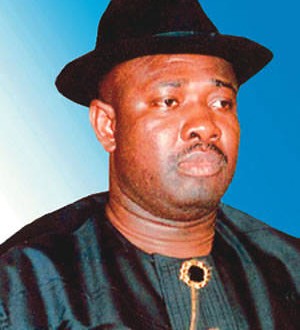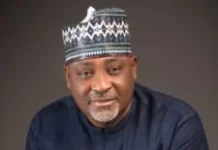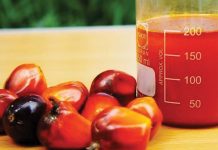The Minister of State for Agriculture, Sen. Heineken Lokpobiri, on Monday gave an assurance that the country would have sufficient food in the next harvest season.
Lokpobiri gave the assurance while speaking with State House correspondents after he led a foreign agro-investor, Wells-San Carlos Agro Farms Ltd., on a courtesy visit to Vice President Yemi Osinbajo at the Presidential Villa, Abuja.
He attributed the current high cost of foodstuff due to the lack of investment in agriculture in 2015 due to the change in government.
“That is why you are seeing a scarcity of rice and the price has gone up to about N25,000 a bag.”
“But this year, the President (Buhari) has given us all the support we have requested to see how we can support farmers the little way we can.”
“So that we can give people access to credit, fertiliser and seed to grow sufficiently for our own consumption and export.’’
The minister also noted that the dependence of other West African countries on Nigeria had also contributed to the high cost of foodstuff in the country.
“Everybody is focused on Nigeria because we have the best soil and we believe that with the president’s determination, our agenda in agriculture will be able to produce enough rice to feed ourselves and satisfy the regional needs.
On the nation’s rice programme, the minister said that the ambition of the administration was to be self-sufficient in rice production by 2018/2019.
According to him many programmes have been put in place including the ‘Anchor Growers’ Scheme’ in Kebbi State.
Lokpkobiri added that the Federal Government had set up a task force headed by the Kebbi governor to multiply rice and wheat production.
“We are also trying to create some funds to see how people can borrow the way Kebbi people borrowed to cultivate over 1,000 hectares.”
“This is so that we can produce as much as we can and satisfy our local needs by 2018/2019.’’
On the visit of the Mexican investors, he said it was to further encourage the company which has plans to cultivate about 9,000 hectares.
“They are already doing and installing about 30 hectares of green houses and as at today, they are employing about 600 people.”
He said the firm was one of the leading farmers in the world and had come to Nigeria to partner the government to see how it could create commercial farms in Nigeria.
“It is not only to satisfy our local market but also to export, so that we can also substitute in agro dollars the petro dollars and also to create jobs. This farm alone is going to create about 85,000 jobs.”
“We are trying to see how we can encourage Nigerians to go into farming in collaboration with those who will bring their technology.”
“This is to ensure that we achieve our objectives in agriculture and food sufficiency in the shortest time possible,’’ he added.
Also speaking, the Executive Director, Nigerian Export Promotion Council (NEPC), Mr. Olusegun Awolowo, described the investment as “the kinds of transformational export projects that the country is looking for now.”
He said that the country was shopping for large-scale commercial farms such as the Wells–San Carlos group, adding that its 9,000 hectares would be the first export farm for the NEPC.”
“This is not the two-hectare or three-hectare programme; we need the large commercial farms because that is the only thing that can solve our problems.”
“Now we would win import substitution and then we now export, feed the nation and provide employment.’’
Awolowo invited the private sector to embrace commercial agriculture because of its high revenue yield through export.
The Chairman, Wells–San Carlos Agro Farms Ltd., Capt. Idahosa Okunbo, told correspondents that the first 9,000-hectare farm was being cultivated in Edo with another 20,000 green house project already in operation.
“This is a veritable project that will employ our youths; it will also create the relevant foreign exchange that we need.”
“We need the government support because this is the way that we can overcome the dependence on oil, and our farm, if replicated in the six geopolitical zones, will take away youths from the street and earn us foreign exchange.”
“It is a double edged advantage for the country and something that we can encourage as a legacy project,’’ Okunbo said.
(NAN)













